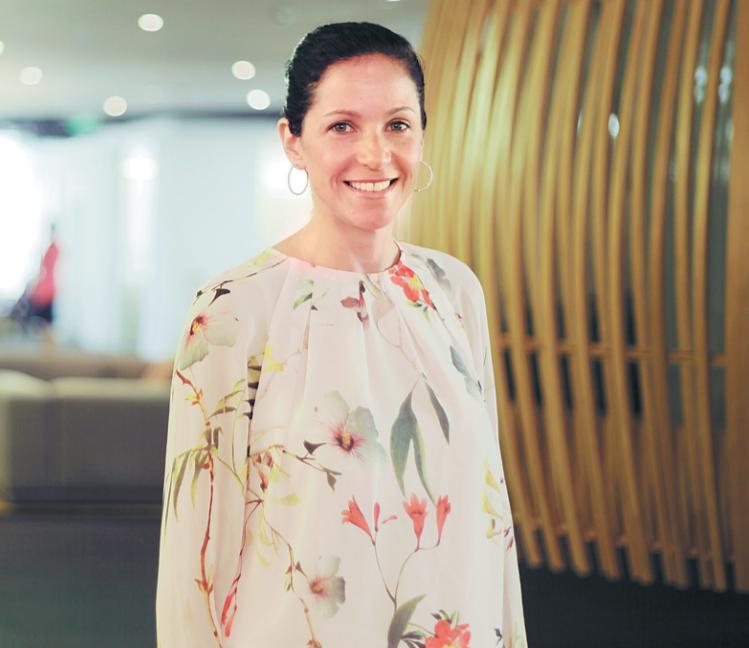Consumers benefiting from competition
By Wang Zhongqiong | China Daily | Updated: 2018-06-01 10:16

Editor's Note: This year marks the 40th anniversary of China's reform and opening-up. China Daily interviewed top executives of well-known multinational companies for their views on the country's socioeconomic development.
Education First expects to continue developing products, services and accessibility to the advantage of the general public in China
Please use three words to describe China's changes in the past 40 years.
Controlled, balanced and aspirational.
What are the biggest achievements in China since the introduction of the reform and opening-up policy 40 years ago?
China actively participates in and drives the global economy, and nearly all Chinese people have been beneficiaries of reform and opening-up, directly or indirectly. The country has become a key incubator for innovation and a driver of policies designed to protect and improve our future.
What's the biggest challenge China faces today and how can the country overcome it?
The biggest challenge for China is managing nearly 1.4 billion people's expectations about their lives, their opportunities and the role of their country on the global stage.
How has your company benefited from the reform and opening-up policy?
Our stated mission at EF is Opening the World Through Education. This is well-aligned with reform and opening-up, in that English is still the global language of business and policy. So as China has grown, we have grown. It is a result of China's encouragement of more foreign investment in the country, as well as State-owned and domestic privately owned companies expanding overseas. We like to see ourselves as facilitators of reform and opening-up.
Has competition intensified between your company and Chinese companies?
Competition in our industry is fierce and increasingly intense among both local and foreign companies. That said, I believe that competition is healthy in any industry. The primary beneficiary of true competition is the consumer and that is whom we should all exist for.
Competition, especially local competition, forces us all to continue to develop our products, services and accessibility, to the benefit of the general population, whom one may argue local companies understand better than their foreign counterparts. The rise of our local competitors has forced us to better connect with Chinese people, organizations, partners, media and the government, and I believe that is a positive thing.
How do you view China's role in the world today?
China's role is clear. It is one of the top three countries of influence in the world, which is a blessing and a responsibility. It is China's responsibility to participate in progress, peace, economic stability and the improvement of its citizens' and the rest of the world's citizens' lives. China is a weight on the scales, and where it puts its weight will have clear and imminent positive or negative effects.
Could China's experiences and practices be used to solve global problems?
There are a lot of countries with large populations struggling to maintain order, steady economic development, balanced budgets, investments in the future, in areas such as infrastructure and the environment, and investments in the short-term, such as cybersecurity and accessible healthcare. These countries of course can and should take notes from China's playbook. Although not every aspect of China's success is transferable to every country, many aspects are.
What measures are needed if China wants to deepen reforms?
In order to deepen reforms, my expectation is that we will see more streamlining of processes to support business growth, as well as more equal incentives for foreign and local companies to invest and feel confident in being able to realize a return on that investment.
We will be looking closely at the education and training industries, and policies related to licensing, standardized testing and key economic zones for testing reform. We look forward to greater clarity and more policies to support the growth of the language training industry specifically.
With the power of a common language, we believe that China can tell its own story to a wider audience.
What is the most unforgettable experience you have had in China?
I had my two children here in China. Never could I have learned more about the country's culture and values than by bonding with my Chinese colleagues over cultural traditions on the most basic human level. I have a new understanding of this country, its people, its policies, and even myself by starting my family here. My kids are trilingual and are true citizens of the world. I think that may be the greatest gift I could give them.
Apart from economic development, what progress in other fields have you witnessed in China in the past 40 years?
The three key areas in which I have seen significant progress over the past 40 years outside of the economy are: healthcare accessibility and quality; infrastructure investment, reach and quality (air, land, sea, between and within cities); and local innovation instead of replication in technologies that have changed how we live, such as Alibaba's AliPay platform and Tencent's WeChat app.
What will be the country's "calling card" in the coming years?
My hope is that China's calling card will be a role as The Protector of the Future, specifically around keeping global peace, driving policy to protect the environment and taking a balanced approach to global economic growth, of which the world's poor would be beneficiaries in terms of cheaper access to healthcare and infrastructure.
CV
Name: Annabelle Vultee
Age: 42
Nationality: United States
Career:
At present: COO, EF English Centers, Education First
Previously: President of Smithsonian Student Travel, EF; and joined EF in 2010 as director of business analysis and strategy for EF Educational Tours
Before 2010: Worked for Coca Cola's marketing division in San Diego, Seattle and Honolulu; and COO of a high-end fractional aircraft ownership business
Education:
Bachelor of Arts degree from Colgate University MBA from Harvard Business School
























